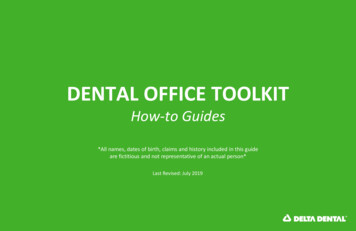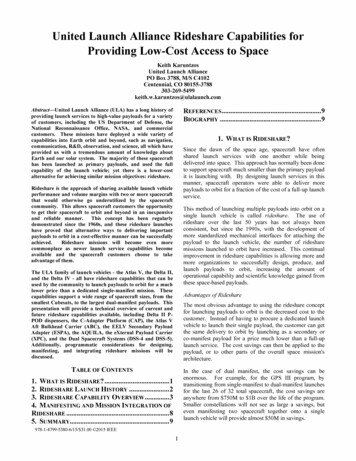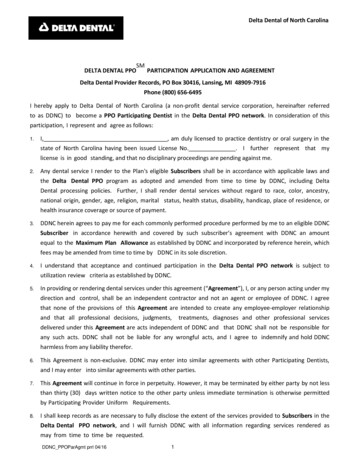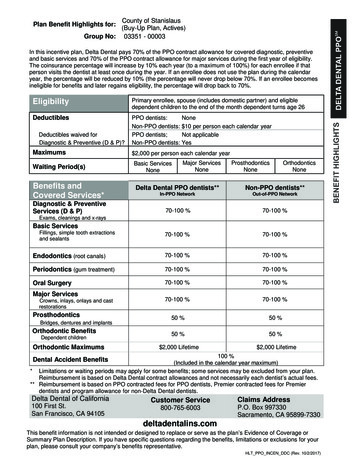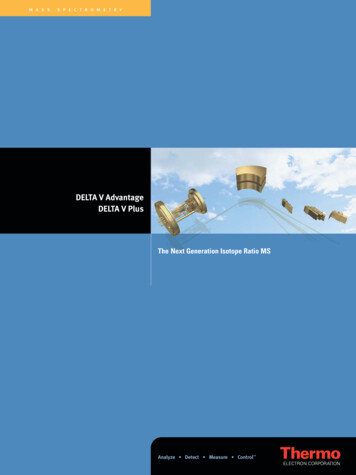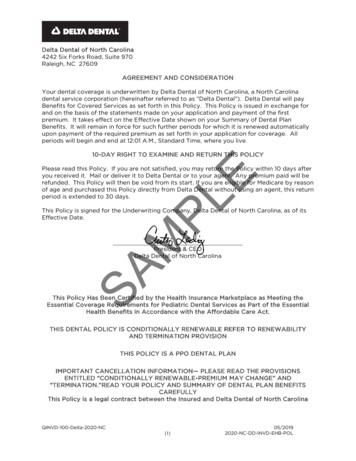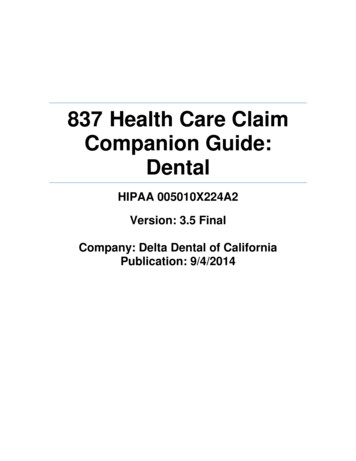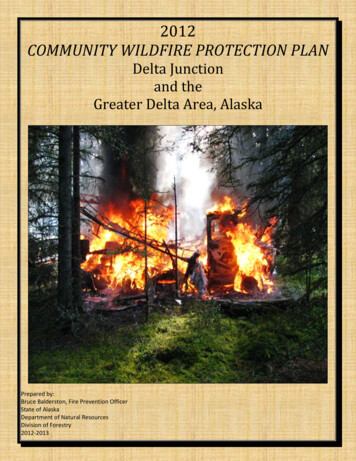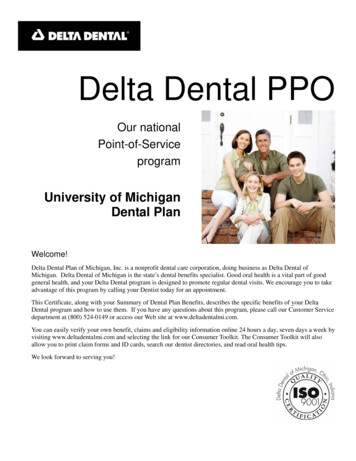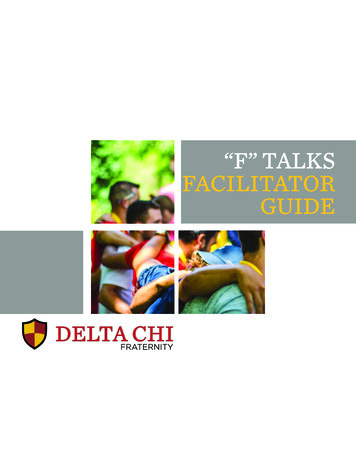
Transcription
“F” TALKSFACILITATORGUIDE
“F” TALKS OVERVIEW“F” TALKSOVERVIEWWeekWeek 1Topic Values-Based Approach to Health & WellnessWeek 2 Delta Chi Risk Management PoliciesWeek 3 Exploring the Hazing ContinuumWeek 4 On-Campus Resources for Mental HealthWeek 5Week 6 Consent and Sexual Assault Awareness Alcohol Management at EventsWeek 7 Emergency Management PlanWeek 8 Bystander Intervention***** - Topics that can be substitued are indicated with an asterisk.ADDITIONAL “F” TOPICS1Alcohol Misuse: Review drinking games, underage drinking, pub Planning alcohol free socialscrawls, socials, bulk buying Alcohol usage in chapter facilities How to deal with an intoxicated member2Illegal Drug Use: Signs of drug addiction Guide to club drugs3Sexual Assault, Abuse and Harassment: Sexual assault, abuse and harassment Sexist remarks and attitudes4 Why hazing doesn’t work and alternatives tohazingMental Health Masculinity Eating Disorders3 Personal safety tips Dealing with sexually transmitted diseasesHazing Prevention: Hazing policies (local, state and federal) Myths and facts about hazing5 Identifying a member’s substance abuseproblem Criminality of purchasing illegal drugs “F” TALKS DELTA CHI Anxiety and Mood Disorders
“F” TALKS OVERVIEW6789House Security & Fire Safety: Fire prevention methods & fire drill procedures House security, alarms, lighting safety Proper use of a fire extinguisherParty Accidents or Death: Potential accidents/Safety risks at parties How to help a member in physical trouble Recognizing alcohol poisoning Emergency first aid Ways to have a safe spring break tripEthics, Morality and Criminal Acts: Defining criminality Code of ethics The meaning of morality in the 21st century Cheating in academicsPersonal Health: Risks of being overweight Guideline to healthy eating in college Facts about smoking tobacco10 Negative health effects of smoking pot, evenif it’s legal Signs of prescription drug use First Aid for beginnersDiversity & Inclusion Bias, oppression, and microaggressions Effects of ISM’s (Racism, Sexism, etc. NotesDELTA CHI “F” TALKS 4
“F” TALK VALUES-BASED APPROACH TO HEALTH AND WELLNESSVALUES-BASED APPROACHTO HEALTH AND WELLNESSSection Time: 30 minutesFACILITATOR TALKING POINT (2 MIN) Our values are at the core of what we doand why exist. They are what make usrelevant on our campuses, and withinsociety. Upholding the values, standards,and expectations of our fraternity is a partof being a good member. Delta Chi has four main values that arereflected in our preamble – does anyoneknow the four values? Share the four values of Delta Chi (PromoteFriendship, Develop Character AdvanceJustice, Assist in the Acquisition of a SoundEducation)FACILITATOR TALKING POINT (2 MIN) Verbalizing our values allows us to recognizetheir importance and continuously allow usto reflect on their meaning. Our values aremore than just words, they are formulatedin a way of action. In line with this way of thinking, Delta Chihas a values-based approach to Health andWellness. We are going to go through these10 approaches as a group and discuss theirimportance to the fraternity.ACTIVITY INSTRUCTIONS (10 MIN) Discuss the 10 approaches by following thePowerPoint.ACTIVITY INSTRUCTIONS (12 MIN) Ask the participants to form groups (nomore than three) and choose one of the tenapproaches. The facilitator should makesure that no group has chosen the sameapproach. They should discuss how that approachpromotes friendship, develops character,advances justice, and assists in theacquisition of a sound education. The facilitator should ask a few groups toshare.5 “F” TALKS DELTA CHICLOSING (4 MIN) Remind participants that our values are thefoundation of Delta Chi. Share that thereare policies that align with these approaches,that will be discussed during the next “F”Talk. Facilitator should close out the sessionby providing phone numbers and campuslocations of police, fire, and paramedicservices. Notes
“F” TALK EXPLORING THE HAZING CONTINUUMEXPLORING THE HAZINGCONTINUUMSection Time: 35 minutesFACILITATOR TALKING POINT (1 MIN) There are many definitions of hazing(campus, international fraternity, state,federal, etc.) The definition of hazinghas and will continue to change. DeltaChi defines hazing as “Any action taken, orsituation created, intentionally, where onor off fraternity premises, to produce mentalor physical discomfort, embarrassment,harassment, or ridicule.” Policy can also be found in the Delta ChiRisk Management Policies document onpage one.FACILITATOR TALKING POINT (4 MIN) Harassment can be defined as a course ofaction which annoys, threatens, intimidates,alarms, or put another person in fear of theirsafety. Examples of this are verbal abuse, threatsor implied threats, or sleep deprivation ordisplacement. This includes asking members to wearembarrassing attire or attire that they arenot comfortable with, skit nights withdegrading or humiliating acts, or line-upswith quizzing.DEBRIEF (3 MIN) What are some words or phrases that stickout to you? Why? What are your initial reactions to the policy?FACILITATOR TALKING POINT (4 MIN) Violent hazing refers to behavior that havethe potential to cause physical, emotional,and/or psychological harm. Examples of this are kidnapping, beating,paddling, or other forms of assault. This includes forced consumption ofsubstances, bondage, branding, or beingconfined in a room for an extended periodof time.FACILITATOR TALKING POINT (1 MIN) Hazing is multifaceted and very complex.Not all hazing looks or feels the same way.Rather than a list of things that are hazingand things that are not hazing, the fraternitylooks at it as a continuum. We are now going to discuss three categoriesof hazing: subtle hazing, harassment, andviolent hazing.FACILITATOR TALKING POINT (4 MIN) Subtle hazing refers to behavior thatemphasizes a power imbalance betweenmembers of a group. These types of hazingare often taken for granted or accepted as“harmless” or meaningless, which is wherethe term “subtle” comes from. Examples of can be expecting certainitems to always be in one’s possession (i.e.Cornerstone), socially isolating members. This includes using demeaning names,assigning demerits (i.e. clean the house ifyou can’t name the founders), and deception,which includes silent periods with impliedthreats for violations (i.e. talking to peopleduring initiation week will result in you notgetting initiated).ACTIVITY INSTRUCTIONS (4 MIN) Facilitator should discuss the graphic onthe PPT slide and use the “Facilitator TalkingPoint” listed below as reference.FACILITATOR TALKING POINT (3 MIN) These three themes make up a continuumof hazing in which the recognition andfrequency change. For example, SubtleHazing has low recognition but happensmore often than harassment or violenthazing. Subsequently, violent hazing iseasily recognizable but tends to happen lessthat subtle forms of hazing or harassment.ACTIVITY INSTRUCTIONS (5 MIN) Facilitator should go through the exampleson the PPT slides and ask participants ifthe example is subtle hazing, harassment, orviolent hazing.Continued on next page.DELTA CHI “F” TALKS 6
“F” TALK EXPLORING THE HAZING CONTINUUMEXPLORING THE HAZINGCONTINUUM Correct answers will appear on the PPT byadvancing to the next slide. Examples listed in the PPT are: Kevin tapes a fifth of Jack Danielsto David’s hands for a game, andforces him to drink it before he cango to the Tailgate (Violent Hazing) Active members require AssociateMembers to participate in a skit forsorority members that includescrude humor (Harassment) Associate Members are lined upshoulder to shoulder and expectedto recite information about Delta Chi’shistory when called upon (SubtleHazing) Associate Member Aaron is forced tocarry Pete’s books for class(Harassment) Charles expects the AssociateMember class to steal a sign from aneighboring fraternity (ViolentHazing) The Associate Members are not toldwhen they are being initiated (SubtleHazing)CLOSING (4 MIN) Remind participants that they can report ahazing incident or a suspected incident (thatis not immediately putting someonein danger) by contacting the Delta ChiInternational Headquarters via phone oremail. The report can be anonymous,and the headquarters staff are bound toconfidentially. Facilitator should close out the session byproviding any on-campus resources that arerelated to this topic.7 “F” TALKS DELTA CHI Notes
“F” TALK ON-CAMPUS RESOURCES FOR MENTAL HEALTHON-CAMPUS RESOURCES FORMENTAL HEALTHTime allotted for this will vary based on thepresenter. NotesA Mental Health Professional should discussthis topic with Associate Members, asopposed to the “F”. You should reach outto a trained professional on your campusor within the local community. This couldinclude a professional in the Health Center,Wellness Office, University Counselor, or amental health expert in close proximity (on oroff campus). Mental health is a multifacetedtopic. When reaching out to secure a contentexpert, consider providing the points listedbelow to help drive the content they willcover: Symptoms of depression/how torecognize it in others Habits that impact mental health How can I help myself if I strugglewith my mental health? How can I help a brother of theystruggle with their mental health? What should we do in a mental healthemergency? What resources are available on thecampus (If not already discussed viaprevious prompts)DELTA CHI “F” TALKS 8
“F” TALK RISK MANAGEMENT POLICIESRISK MANAGEMENTPOLICIESSection Time: 30 minutesFACILITATOR TALKING POINT (2 MIN) The Risk Management Policies are a way forour chapter/colony to tangibly outline whatis acceptable; they define our culture. All chapters/colonies, entities of theFraternity and levels of membership areheld to the same standard and expected toabide by these policies. We will now discuss the Delta Chi RiskManagement Policies, which include policieson alcohol and drugs, hazing, sexual abuseand harassment, gambling, and safety.ACTIVITY INSTRUCTIONS (20 MIN) Use to PPT to go through the 10 policiesrelated to alcohol and drugs (found onpage one of the Delta Chi Risk ManagementPolicies document). Briefly go over the definition of hazing,as stated in the policies document. Letparticipants know that this will be a topicof another “F” talk, where you will go overhazing more in-depth. Discuss sections III, IV, V, and VI of the riskmanagement policies. Using the PPT, go over the Good SamaritanPolicy as it relates to both individuals andthe chapter/colony. FACILITATOR NOTE: If the chapter/colonyhas additional risk management policiesthat are mandated by the university, theInterfraternity Council, and/or the Fraternityand Sorority Life Office, those should alsobe discussed at this time.FACILITATOR TALKING POINT (5 MIN) Discuss how you hold members accountableto these policies. This should include anyjudicial board proceedings that may comefrom not following the policies and anyother repercussions. If you discussed any additional campuspolicies, you should discuss how the chapter/colony is held accountable if those policiesare violated.9 “F” TALKS DELTA CHICLOSING (3 MIN) Remind participants that they are expectedto abide by these policies at all times. Thepolicies are ‘how’ we do what we do andare expected to be at the forefront of ouroperations as a chapter/colony. Facilitator should close out the session byproviding relevant campus or communityresources. Notes
“F” TALK CONSENT & SEXUAL VIOLENCE PREVENTIONCONSENT & SEXUALVIOLENCE PREVENTIONTime allotted for this will vary based on thepresenter. NotesA trained professional should discuss thistopic with Associate Members, as opposed tothe “F”. You should reach out to someone onyour campus or within the local community.This could include a professional in the Title IXoffice, the Dean of Students Office, a SexualAssault Advocacy/Prevention Center, or anexpert in close proximity (on or off campus).Sexual violence and consent are both in-depthand sensitive topics. When reaching out tosecure a content expert, consider providingthe following points to help drive the contentthey will cover: Definitions of sexual violence andprevention What role does alcohol play in sexualassault and consent Ways to give and receive consent How to report sexual violence(assault, abuse, etc.) Resources for survivors of sexualviolence What resources are available on thecampus (If not already discussed viaprevious prompts)DELTA CHI “F” TALKS 10
“F” TALK ALCOHOL MANAGEMENT AT EVENTSALCOHOL MANAGEMENT ATEVENTSSection Time: 35 minutesFACILITATOR TALKING POINT (2 MIN) On April 30, 1922, Delta Chi became a socialfraternity, eliminating the requirement formembers to be studying law; this openedmembership to all areas of study. Delta Chiis referred to a social fraternity because ithelps prepare members for life in society. With this, comes many privileges, such asparticipation in member events. We are going to discuss what constitutes achapter/colony event, and the differenttypes of events that are allowed.ACTIVITY INSTRUCTIONS (4 MIN) Facilitator should ask participants whatconstitutes a chapter/colony event. Facilitator should go through questions onthe PPT (also listed below). Is the event listed and/or advertisedon the chapter/colony website orsocial media? Is the event listed on chapter calendar(on/off line)? Will event be announced at chaptermeeting? GroupMe/Group text? Will any chapter officers be present? Do online invitations/guestlists referto your chapter/colony? Would a reasonable observer sayit was your event? (i.e. Your GreekAdvisor, an employee of the university,a neighbor/community member, yourparent/guardian).FACILITATOR TALKING POINT (1 MIN) Once we have identified that the event is aDelta Chi event, it should be categorizedas one of three event types: an event withoutalcohol, a BYOB event, or a 3rd Party VendorEvent. We will now discuss the three types ofevents in more detail.ACTIVITY INSTRUCTIONS (4 MIN) Facilitator should use the PPT to discussthe three event types in detail. Use theinformation below for reference. Without Alcohol BYOB: Guests bring their own beveragesthat they check at the “bar” area; onebeverage at a time.11 “F” TALKS DELTA CHI 3rd Party Vendor: Contract with a 3rd partyto provide beverage service to 21 attendeesare able to purchase individual drinksFACILITATOR TALKING POINT (1 MIN) Two of our event types permit theconsumption of alcohol of members andguests who are of legal drinking age. While Delta Chi allows alcohol at events, wedo have some provisions related to the typeand quantity allowed. We are now going todiscuss the do’s and don’ts of alcohol at ourevents.ACTIVITY INSTRUCTIONS (10 MIN) Facilitator should use PPT to discuss thetypes of alcohol that are allowed at BYOBevents and Third-Party events. Facilitator should remind participants ofless than 15% ABV policy, located in the DeltaChi Risk Management Policies documentthat was discussed in a previous “F” Talk. FACILITATOR NOTE: The alcohol contentin beer, wine, and malt beverages is below15% ABV. However, hard alcohol or spiritsare above 15% ABV (30 proof). Most ofthe severe injuries and deaths in fraternitiesinvolve the use of “hard alcohol”, which iswhy it is prohibited. While alcohol is allowed at theseevents, you should avoid glassbottles, water bottles, pitchers,tumblers, flasks and other outsidecontainers because their contentsare difficult to identify. Kegs and other common sourcealcohol are to be avoided. Rapidconsumption of alcohol, includingshots, drinking games, and beerbongs should be excluded from DeltaChi events.FACILITATOR TALKING POINT (1 MIN) When alcohol is present at our events,it is important that we recognize signs ofoverconsumption and when/how to seekhelp from others.Continued on next page
“F” TALK ALCOHOL MANAGEMENT AT EVENTSALCOHOL MANAGEMENT ATEVENTSACTIVITY INSTRUCTIONS (5 MIN) Facilitator should discuss the ABC methodoutlined in the PPT. For reference, the ABCmethod consists of Alertness, Breathing,and Color. Facilitator should go through the “Do’s” and“Don’ts” with regard to alcohol consumption;specifics are listed in the PPT. NotesFACILITATOR TALKING POINT (5 MIN) Facilitator should revisit the GoodSamaritan Policy (located in the Delta ChiRisk Management Policies document onpage two). FACILITATOR NOTE: If the university hasa Good Samaritan Policy and/or AmnestyPolicy, it should be shared at this time.CLOSING (2 MIN) Facilitator should close out the session byproviding any on-campus resources that arerelated to this topic.DELTA CHI “F” TALKS 12
“F” TALK EMERGENCY MANAGEMENT PLANEMERGENCY MANAGEMENTPLANSection Time: 20 minutesFACILITATOR TALKING POINT (2 MIN) This Emergency Management Plan has beencreated to help chapters/colonies when anemergency occurs. No one can predict whensuch an event will happen. When somethingdoes happen though, it is easy to make analready bad situation worse, especially whentime is short, and emotions are high. Delta Chi cares about its members, associatemembers, and guests. By following theprocedures outlined in the followingprocedure and adhering to the RiskManagement Policy of Delta Chi, ourchapters/colonies can reduce the risk of aregrettable incident by being prepared andinformed.ACTIVITY (15 MIN) Facilitator should go over the EmergencyManagement Plan using the PPT and answerany questions.CLOSING (3 MIN) Facilitator should close out the session byproviding any on-campus resources that arerelated to this topic.13 “F” TALKS DELTA CHI Notes
“F” TALK BYSTANDER INTERVENTIONBYSTANDER INTERVENTIONSection Time: 35 minutesFACILITATOR TALKING POINT (1 MIN) Ask participants what the Bystander Effect is. The Bystander Effect is a social phenomenonthat refers to situations in which individualsdo not offer help to a victim when otherpeople are present. The greater the numberof bystanders, the less likely it is that anyone of them will help.ACTIVITY (2 MIN)Below is a video (2 minutes, 9 seconds) thatoutlines to bystander effects.https://www.youtube.com/watch?time continue 2&v wW2xszD-zBMDEBRIEF (5 MIN) What are some initial reactions to the video? From your perspective, why is it that groupsof bystanders don’t help someone in need?FACILITATOR TALKING POINT (5 MIN) We have spent some time talking aboutthe Bystander Effect and how it playsout in everyday life. In order to combat theBystander Effect, we must intervene. In orderto intervene, first someone has to:1) Notice the Incident: Bystanders firstmust notice the incident takingplace. It’s important to become attuneto what situations may be risky; i.e.,if you’re at a party, and you seesomeone stumbling as they’re beingled into a different room, this is a riskysituation.2) Interpret the incident as important:By “important,” we mean a situationwhere there is immediate risk or riskoccurring in the near future.3) Assume responsibility for intervening:It has been found that often, peoplebelieve that someone else will helpin a situation where there are manypeople around. However, it is importantto realize that others may also bethinking the same thing. If you’reunsure if you should do something,ask a friend what they think -- it mightbe the case that they’ve been thinkingthe same thing.4) Use an appropriate interventiontechnique: There are a number ofdifferent techniques that someonecan use to intervene in a risky situation,some of which we will discuss in thenext section.FACILITATOR NOTE (1 MIN) Now that we have discussed what someoneneeds to consider before intervening, we aregoing to talk about techniques. There are “4D’s” of Bystander Intervention: Direct, Distract,Delegate, and Delay; we are going to go overeach one more in-depth and provide examplesof how you can execute them. Please remember that your safety is of theutmost importance. When a situation thatthreatens physical harm to yourself or anotherstudent, ask someone for help or contactCampus Police.FACILITATOR TALKING POINT 1 (2 MIN) Direct: Step in and address the situationdirectly. This might look like saying, “That’s notcool. Please stop.” or “Hey, leave them alone.” This technique tends to work better when theperson that you’re trying to stop is someonethat knows and trusts you. It does not work wellwhen drugs or alcohol are being used becausesomeone’s ability to have a conversation withyou about what is going on may be impaired,and they are more likely to become defensive. Get someone to help you if you see something– enlist a friend, RA, bartender, or host to helpstep in.FACILITATOR TALKING POINT 2 (2 MIN) Distract: Distract either person in the situationto intervene. This might look like saying, “Hey,aren’t you in my Spanish class?” or “Whowants to go get pizza?” This technique is especially useful when drugsor alcohol are being used because peopleunder the influence are more easily distractedthen those that are sober.Continued on next pageDELTA CHI “F” TALKS 14
“F” TALK BYSTANDER INTERVENTIONBYSTANDER INTERVENTIONFACILITATOR TALKING POINT 3 (2 MIN) Delegate: Find others who can help youto intervene in the situation. This mightlook like asking a friend to distract oneperson in the situation while you distractthe other (“splitting” or “defensive split”),asking someone to go sit with them andtalk, or going and starting a dance partyright in the middle of their conversation. If you didn’t know either person in thesituation, you could also ask around to seeif someone else does and check in withthem. See if they can go talk to their friend,text their friend to check in, or intervene.FACILITATOR TALKING POINT 4 (2 MIN) Delay: For many reasons, you may not beable to do something right in the moment.For example, if you’re feeling unsafe or ifyou’re unsure whether or not someone inthe situation is feeling unsafe, you may justwant to check in with the person. In this case, you can combine a distractiontechnique by asking the person to use thebathroom with you or go get a drink withyou to separate them from the person thatthey are talking with. Then, this might look like asking them, “Areyou okay?” or “How can I help you get outof this situation?” This could also look liketexting the person, either in the situation orafter you see them leave and asking, “Areyou okay?” or “Do you need help?”DEBRIEF (4 MIN) What are your initial reactions to thesetechniques? Are they realistic? Have you seen them besuccessful?FACILITATOR NOTE (1 MIN)We are now going to spend some timereflecting on a situation in our lives where wewere the bystander and how we could havereacted differently. This activity is meantto be reflective and will not be shared withanyone.15 “F” TALKS DELTA CHIACTIVITY (2 MIN)Invite associate members to write about atime they witnessed a difficult situation and/or heard about one and remained silent.What prevented them from intervening? Inretrospect, what could they have done at thetime?CLOSING (6 MIN)Facilitator should close out the session byproviding any on-campus resources that arerelated to this topic. Notes
APPENDIX RISK MANAGEMENT POLICIESAPPENDIXRISK MANAGEMENT POLICIESThe Risk Management Policy of the Delta Chi Fraternity includes the provisions that follow and shall applyto all Fraternity entities and all levels of Fraternity membership.I. ALCOHOL AND DRUGSI)The presence, consumption and use of any alcohol product containing more than 15% alcohol by volume(ABV) is prohibited at any chapter facility or chapter event, except when served by a licensed andinsured third party vendor. The presence, possession or consumption of an alcohol product below 15%ABV at a chapter facility or chapter event shall be in compliance with all of the provisions of this Policyand all applicable laws of the state, province, county, city and institution of higher learning.II)No alcoholic beverages shall be purchased through or with chapter funds nor shall the purchase of samefor members or guests be undertaken or coordinated by any member in the name of or on behalf of thechapter. The purchase or use of a bulk quantity or common source(s) of alcoholic beverage, for example,kegs or cases, is prohibited.III)SOCIAL EVENTS, meaning those with unrestricted access by non-members of the fraternity, withoutspecific invitation, where alcohol is present, are prohibited. Any event with alcohol present that can beassociated with the fraternity requires a guest list prepared 24 (twenty four) hours in advance of theevent submitted to the Chapter “F” and Social Chairman, and must comply with either the Bring YourOwn beverage (BYOB) or Third Party Vendor Guidelines as set forth in the Social Event Planning Guide.IV)No members, collectively or individually, shall purchase for, serve to, or sell alcoholic beverages to anyminor (i.e., those under legal drinking age).V)The possession, sale or use of any ILLEGAL DRUGS or CONTROLLED SUBSTANCES while on chapterpremises or during a fraternity event or at any event that an observer would associate with the fraternityis prohibited.VI)No chapter shall co-sponsor an event with an alcohol distributor or any commercial establishment withalcohol, at which alcohol is given away, sold or otherwise provided to those present. This includes anyevent held in, at or on the property of a tavern as defined above for purposes of fundraising. However,a chapter may rent or use a room or area in a tavern as defined above for a closed event held withinthe provisions of this policy, including the use of a third-party vendor and guest list. An event at whichalcohol is present could be conducted or co-sponsored with a charitable organization if the event is heldwithin the provisions of the organization and college or university policy.VII)No chapter shall co-sponsor, co-finance or attend or participate in a function at which alcohol is purchasedby any of the host chapters, groups or organizations.VIII)Alcohol or any illegal substance shall be prohibited during any recruitment or rush activities. No recruitmentor rush activities associated shall be held at or in conjunction with a tavern or alcohol distributor asdefined in this policy.IX)No chapter, colony, member or associate member shall permit, tolerate, encourage or participate in“drinking games.” The definition of drinking games includes but is not limited to the consumption ofshots of alcohol, liquor or alcoholic beverages, the practice of consuming shots equating to one’s age,“beer pong,” “century club,” “dares” or any other activity involving the consumption of alcohol whichinvolves duress or encouragement related to the consumption of alcohol.DELTA CHI “F” TALKS 16
APPENDIX RISK MANAGEMENT POLICIESX)No alcohol may be present at any associate member activity, event or; before, during or after the ritual ofthe fraternity. This includes but is not limited to activities associated with “bid night,” “big brother – littlebrother” events or activities, “family” events or activities, traditions, ceremonies and initiation.II. HAZINGNo chapter, colony, member, associate member or alumnus shall conduct, participate in nor condonehazing activities. Permission or approval by a person being hazed is not a defense.Hazing activities are defined as: “Any action taken or situation created, intentionally, whether on or offfraternity premises, to produce mental or physical discomfort, embarrassment, harassment, or ridicule.Such activities may include but are not limited to the following: use of alcohol, paddling in any form,creation of excessive fatigue, physical and psychological shocks, quests, treasure hunts, scavenger hunts,road trips or any other such activities carried on outside or inside of the confines of the chapter house;wearing of public apparel which is conspicuous and not normally in good taste, engaging in public stuntsand buffoonery, morally degrading or humiliating games and activities, and any other activities which arenot consistent with academic achievement, fraternal law, ritual or policy or the regulations and policies ofthe educational institution or applicable state law.”III. SEXUAL ABUSE AND HARASSMENTI)The Delta Chi Fraternity does not tolerate or condone sexual harassment, stalking, domestic violence,dating violence, or sexual assault, or sexual violence as defined by Delta Chi Law. This is to include anyactions, activities or events, whether on chapter premises or an off-site location which are demeaning towomen or men, including but not limited to verbal harassment, sexual assault by individuals or membersacting together.II)The employment or use of strippers, exotic dancers or similar, whether professional or amateur, at afraternity event as defined in this policy shall not be allowedIV. FIRE, HEALTH, AND SAFETYI)All chapter facilities shall meet all local fire and health codes and standards.II)All chapters shall post, within common areas, emergency numbers for fire, police and ambulance and willhave posted evacuation routes on the back of the door of each sleeping room.III)All chapters shall comply with engineering recommendations as reported by the insurance company ormunicipal authorities.IV)FIREARMS AND EXPLOSIVES. No firearms or ammunition, including air-powered weapons, or explosiveor incendiary devices, including fireworks, shall be possessed, stored, or used in any chapter facility or atany chapter sponsored event, except as authorized by law enforcement officers.V)Candles will not be used in chapter facilities or individual rooms except under controlled circumstancessuch as initiation.VI)No swimming pools, hot tubs, slip and slides or other similar water related activities shall be installed orused at any chapter facility or chapter sponsored event, except that a swimming pool or hot tub thatexists at a chapter facility prior to August 1, 2018 may continue to be used.V.
3 F TALKS DELTA CHI OVERVIEW "F" TALKS "F" TALKS OVERVIEW Week Topic Week 1 Values-Based Approach to Health & Wellness Week 2 Delta Chi Risk Management Policies Week 3 Exploring the Hazing Continuum Week 4 On-Campus Resources for Mental Health Week 5 Consent and Sexual Assault Awareness Week 6 Alcohol Management at Events .
